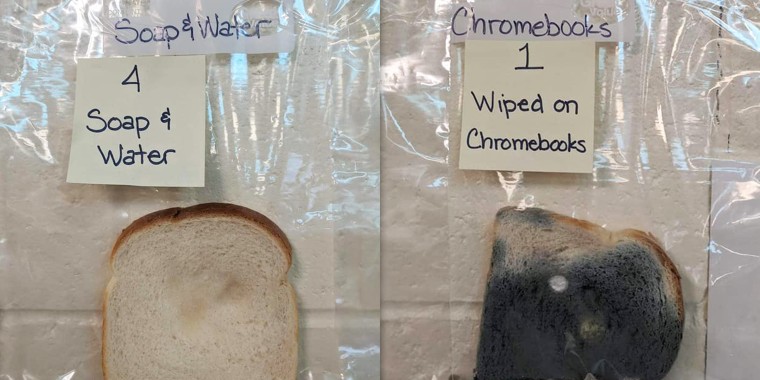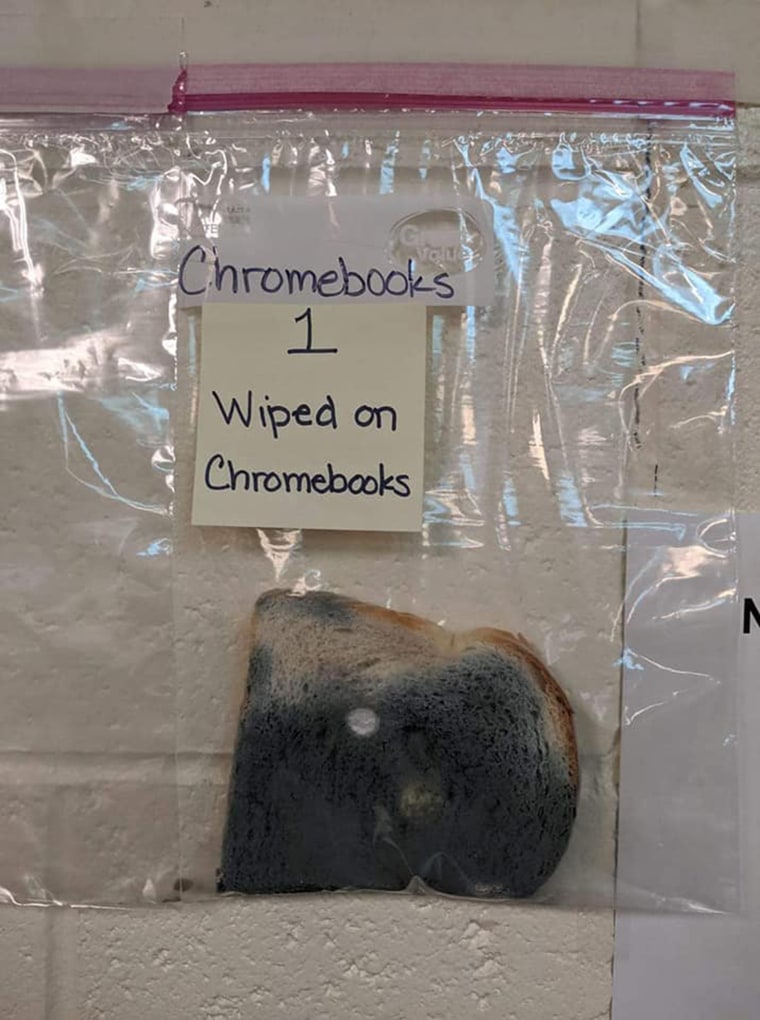A pair of elementary school educators knew their recent experiment with moldy bread had succeeded in teaching their students to regularly wash their hands with warm water and soap when it received a singular reaction.
Ewwwwww! Gross!

Teacher Dayna Robertson, 38, and behavior specialist Jaralee Metcalf, 23, conducted a month-long experiment for special education students at Discovery Elementary School in Idaho Falls, Idaho, showing the effects of germ-filled hands on pieces of bread.
Metcalf posted the results on Facebook with pictures of moldy, black bread that was touched by all 17 students' hands or wiped on a class laptop, and clean-looking bread that was touched by hands washed with soap and water. The post has been shared more than 60,000 times, just in time for flu season.
"The students all thought it was gross," Robertson told TODAY. "They have really turned their hand-washing around (since the experiment). They realized that sanitizer doesn't cut it, and they've got to do soap and water."
The Centers for Disease Control and Prevention reported last week that flu activity is rising across the United States this year with an estimated 2.6 million reported cases and 23,000 hospitalizations.
The class experiment began on Nov. 4 when Robertson individually sealed five different pieces of bread in ziplock bags right after they were touched so that air would not have a significant effect on the molding.
One was touched with unwashed hands, another with hands that had hand sanitizer, another with hands washed with warm water and soap, another rubbed on one of the Chromebook laptops from class, and one that Robertson handled with gloves so that it was untouched by bare hands.

A month later, the results were clear. The bread wiped on the Chromebook was almost completely black and disintegrating, while the one touched by dirty hands wasn't far behind and the one with the hand sanitizer had its own blotch of mold.
"As somebody who is sick and tired of being sick and tired of being sick and tired. Wash your hands!" Metcalf wrote on Facebook. "Remind your kids to wash their hands! And hand sanitizer is not an alternative to washing hands!! At all! This is so DISGUSTING!!!"
The students, who range in age from kindergarten through sixth grade, regularly wipe down the Chromebooks, but they used one that hadn't been recently cleaned for the experiment.
There also were other practical reasons for conducting the experiment.
"We've had very few weeks where we've had all of our staff and all of our students in school (because of illness)," Robertson said.
"I've missed five or six days of school already because of my illness or my son's illness," Metcalf told TODAY. "When kids don't wash their hands, it takes a toll not just on us as teachers, but also on our families."
Parents keeping their children home when they're sick also plays a crucial role in limiting the spread of illness.
"Safety over attendance,'' Metcalf said. "Some of those sicknesses can be dangerous to students and others. We have staff whose parents have cancer and are immunocompromised, so for them to bring illnesses home to them, it can be life-threatening."
The educators got the idea for the experiment from one posted online by C.S. Mott Children's Hospital in Ann Arbor, Michigan.
It now could be conducted in many more classrooms nationwide based on the response to Metcalf's viral Facebook post.
"So many teachers have been commenting, saying, 'I'm totally gonna do this in my class,''' Metcalf said. "It's kind of cool to see that it's inspired a lot of other people to take a look at how they wash their hands to keep healthy."
Plus, there was the immediate benefit to Metcalf and Robertson's own classroom.
"Clearly the nagging didn't work, so we needed a more hands-on approach to get it figured out, but it worked,'' Robertson said before laughing. "They are taking the initiative themselves."